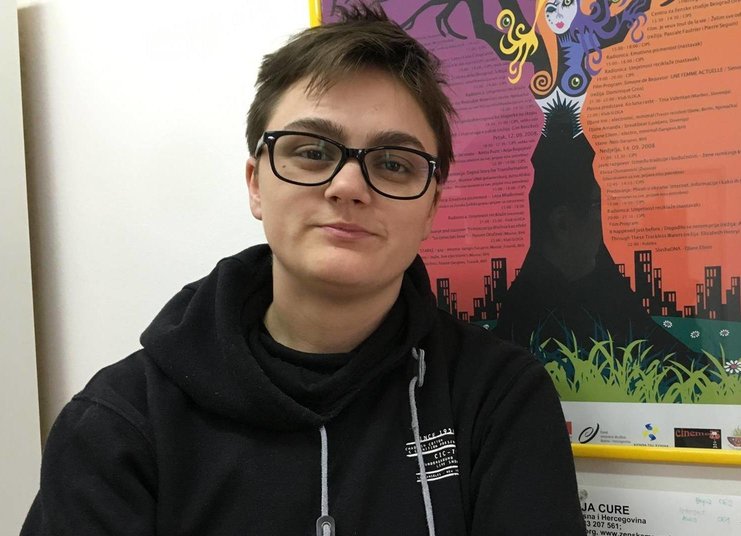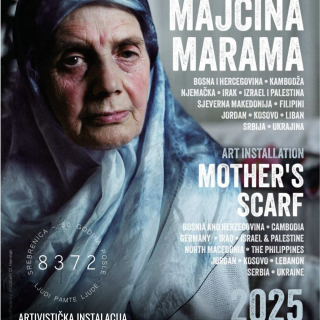This is what this looks like:
- Good afternoon, madam, how are you today?
- I am fine, dear, how are you?
- I am fine. I need the xx certificate, please.
- What is your name?
- Ajna Jusić.
- Father’s name?
- Please, madam, write the name of my mother, Sabina.
- I cannot do that Ajna, we need your father’s name.
- Unfortunately, I do not know his name, so please use my mother’s name, if possible.
- How is it possible that you do not have a father? Please, we do not have the time for this, your father’s name?
- Madam, I really do not know his name. Please write my mother’s name, Sabina, it is a beautiful name.
- How is it possible that you do not know his name?
(I take a deep breath…) Madam, my mother is a survivor of conflict-related sexual violence, so that we do not know the name. Please, let us skip this, leave an empty line. Silence!! Silence that has been there for 25 years. A silence that hurts, a silence of non-existence. Between 30 000 and 50 000 women, young women, girls, and men were raped during the war. Such war crimes have resulted in the birth of children, who have not yet been recognised in the society, but they also have not been recognized under the law of Bosnia and Herzegovina, or the law of any country in the world. There are numerous problems that these children are facing, and one of them is the above issue. Unfortunately, in Bosnia and Herzegovina we still live by the rule according to which a father is a priority, a father is the head of the family, a father is the parent’s name that we all must have. I do not have that name. This name has been defining me for 25 years, and I do not even have it. As a result, I face daily discrimination. This name has marked me. People frequently ask me why I still have not graduated, although I completed my studies a long time ago. I always say that I have no time to go and get all the documents. On the other hand, however, I suffer due to the fact that my mother has dreamed about my graduation all her life. She dreamed about seeing me with a ”flying” academic cap. However, I am afraid that at the end of her dream, she will not find her place on my graduation degree. I am afraid that the degree will contain the ”line” that committed the most atrocious crime against my mother. That line does not deserve to be there. I remember, when I started going to the faculty, my mother went out of her way to provide me with everything I needed. Food, accommodation, books, pens, she even bought me a pencil case when I started my first year of studies. She and my stepfather did whatever they could in order to enable me to get educated. I want her name on that degree.
After the end of the war, the number of women who survived conflict-related sexual violence became clear quickly. The political parties in power started using them even more quickly for their political purposes. Those purposes of those that did not care about the pain of my mother, about the pain of all these women, the purposes of those that decided to leave them alone. To face alone the violence they had survived. They also fought against the society, which was getting more and more poisoned by the policy of such parties. They somehow managed to convince them that it was my mother’s fault that she was raped, they convinced them that my mother was not an honourable woman and that she had to keep quiet about it. Why did she need such a shame? People should not know. And people did not know.
You know, I do not blame the lady at the counter. And I do not like it when they call them counter slackers. It is not her fault that the system in which she works does not recognise the price paid by my mother during the aggression. It is not her fault that they have not taught her to appreciate equality, to appreciate human lives, no matter what they look like. But she can, and I believe that she should, show compassion for me, for my mother and other women like us.
I spent years waiting. I remember that almost every September over the past years I could not wait for scholarship calls, hoping that I would get a scholarship. Hoping that I would get the chance to make the situation of my mother and my dear stepfather at least a little bit easier. This never happened. From day to day, hope was dwindling. I was studying, without any rights, as if I did not exist. I studied alone, without the assistance of the state, my mother financed my studies from her social benefits. At a certain moment, I was also forced to work, and unfortunately, I had to work at a bar. I was there all day long, I studied for my exams at the bar, made coffees and repeated lessons. I was not happy back then, but I had to do it.
Together with my mother and stepfather, I built my courage. I would not have made it without them. They devoted their whole life to me. They did their best to protect me, but as years passed by, I felt the need to scream, the need to tell everyone that I was there. The need to tell everyone and prove everyone that my mother was a hero, that my mother was an honest and dignified woman. That she was a strong woman, who, in spite of everything she survived, first of all fought for me every day, and only then for herself. And she made it. She fought and she taught me to fight. She gave me a voice that I am giving you today. She gave me the strength that I wish to build with the society. She taught me not to hate, to know that we are all equal. She taught me that there are bad individuals, that there are no bad peoples. I still believe it. I am willing to turn every tear into a smile together with the lady from the counter, I am willing to confer degrees of peace, humanity and unity. I hope that we will cross the bridge of separation together with the society, that we will meet in the middle of the bridge and jointly jump into a better future.
Ajna Jusić – graduated from the Faculty of Philosophy, Department of Psychology. Woman, daughter, human rights activist. She is currently focusing on the rights of women who survived conflict-related sexual violence and the rights of children born as a result of conflict. ”When you have a choice, always choose humanity” – is her life motto.




